Sociocultural Aspects of Development
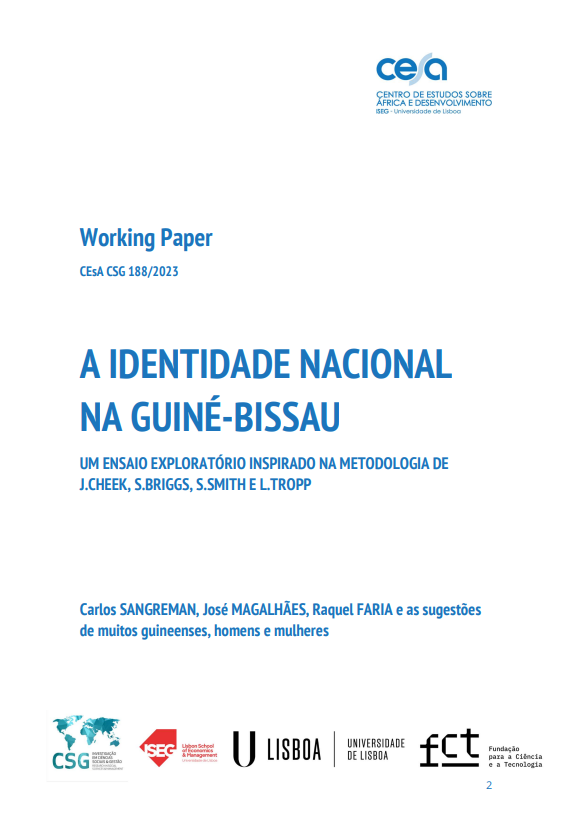
Working Paper 188/2023: A identidade nacional na Guiné-Bissau: um ensaio exploratório inspirado na metodologia de J.Cheek, S.Briggs, S.Smith e L.Tropp
Abstract:
The investigation of A Identidade Nacional na Guiné-Bissau – Um ensaio exploratório inspirado na metodologia de J.Cheek, S.Briggs, S.Smith e L.Tropp is defined as exploratory and aims to evaluate whether the methodology of inquiry and analysis of identity. created by J. Cheek, S. Briggs, S. Smith and L. Tropp, can be adapted to a fragile state like Guinea-Bissau. This methodology consists in the assessment of the importance attributed by the respondents of 70 sentences from which the characteristics of individual and social identity (family and collective) are extracted. The sentences were sent by digital means to 102 Guineans known in person or only by Facebook with request for response and dissemination and obtained 183 responses. These answers, calculated according to the methodology adopted, allowed to define some identity characteristics of the respondents. We tried to interpret these results using other surveys made since 2014 in Guinea-Bissau with different themes. It is concluded by realizing that this is a method that can contribute to the knowledge of the national identity of Guineans, but insufficient. This conclusion remains to be demonstrated if it is carried out with a statistically significant sample.
Quotation:
Sangreman, C., Magalhães, J., Faria, R. (2023). “A Identidade Nacional na Guiné-Bissau – Um ensaio exploratório inspirado na metodologia de J.Cheek, S.Briggs, S.Smith e L.Tropp“. Instituto Superior de Economia e Gestão – CEsA/CSG – Documentos de Trabalho nº 188/2023
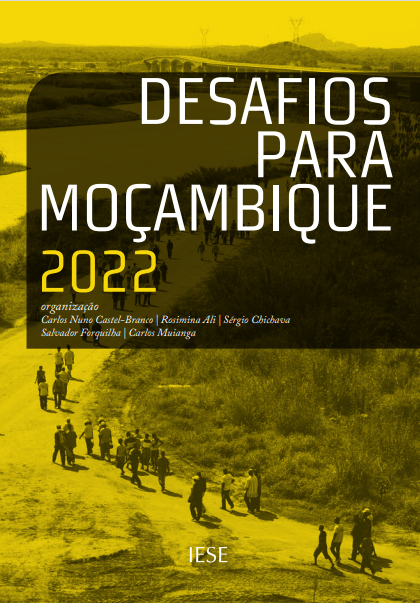
Desafios para Moçambique, 2022
Abstract:
This issue of Desafios para Moçambique (2022) comes as the country faces enormous challenges – the war in Cabo Delgado, with some signs of expansion into other provinces; the Rovuma basin gas extraction and liquefaction projects, which realise some 24 Challenges for Mozambique 2022 Introduction of the greatest challenges in Mozambique’s economic history; the lingering effects of the global crisis, the bursting and implosion of the economic bubble, of which the sovereign debt crisis was a manifestation, and the social and economic after-effects of the covid-19 pandemic. These challenges and crises stimulated research and resulted in lessons, some of which are developed in this issue. Recently ended in Maputo, the trial of some of the state agents and private agents involved in the illicit international financial transactions that resulted in the odious debts. What was already clear before – that these illicit transactions are a reflection of more general dynamics of expropriation, privatisation and financialisation of the state for private accumulation of capital, even if this is done at heavy social costs – has, if possible, become clearer. The hypothesis that the legal process, which we had the opportunity to follow for about a year and a half, only touched on the recipients of commissions for corruption and influence peddling, the executors of the great default against the public purse, was confirmed.
Quotation:
Castel-Branco, C.N., Ali, R., Chichava, S., Forquilha, S., Muianga, C. (2022) Desafios para Moçambique, 2022. IESE. Maputo, Moçambique. ISBN: 978-989-8464-58-3
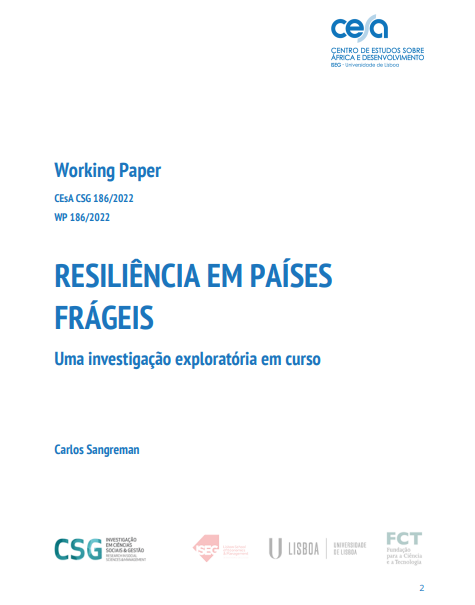
Working Paper 187/2022: Resiliência em Países Frágeis – uma investigação exploratória em curso
Abstract:
Resiliência em Países Frágeis – uma investigação exploratória em curso started in 2017 when the director of a service directorate of the Joint Research Center, at ECAS in Geneva, invited Prof. Carlos Sangreman to an exploratory study on resilience in Guinea-Bissau with the title Context specific risk perception and resilience patterns for individuals and communities (urban/non-urban) – the case of people in Guinea-Bissau. The study was carried out on the basis of the survey whose form is included in this Working Paper, gave rise to the attached article in an international journal and to a PhD thesis in progress at the University of Aveiro. The partnership between JRC and Cesa also involved Professor Alexandre Abreu and Master Jessica Santos, as well as Carlos Sangreman. From the JRC were Chistophe Quétel, Guy Bourdin and Ilektra Lemi. A survey was conducted in all regions and capital of the country to 210 households, with a previous pilot to 36 to refine the questionnaire in this partnership: project Enquêtes de terrain sur la perception du risque et la résilience des ménages en Guinée-Bissau Projet: Ares(2018)2381703 – 04/05/2018. Centre Commun de Recherche (JRC) de la Commission Européenne, Direction E, and CESA – Centre for Studies on Africa and Development of the University of Lisbon.
Quotation:
Sangreman, C., Martins, D., Quetel, C. Abreu, A. e Bourdin, G. (2022). “Resiliência em Países Frágeis – uma investigação exploratória em curso”. CEsA/CSG/ISEG/ULisboa – Documentos de Trabalho nº 186/2022
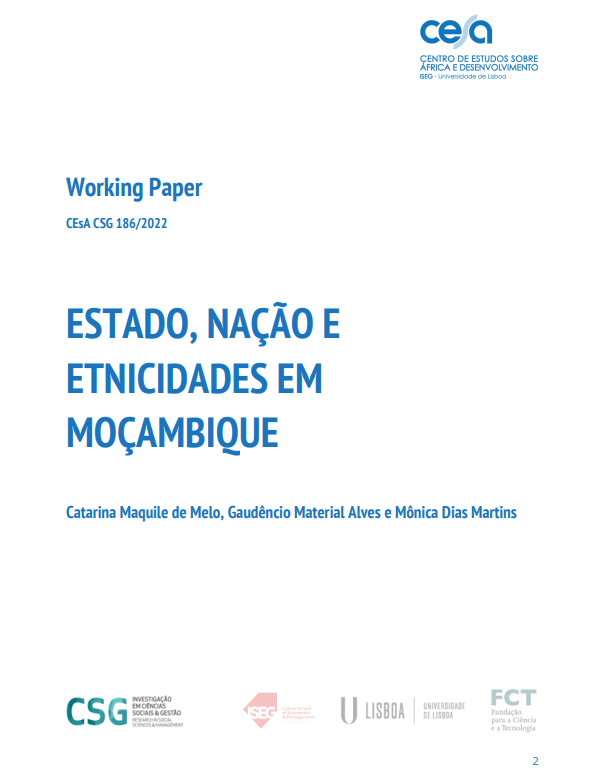
Working Paper 186/2022: Estado, Nação e Etnicidades em Moçambique
Abstract:
The processes of state and nation building begin soon after independence and establish a link between them, although each has its own logic. While the nation refers to collective identity, the State refers to the existence of a central-level political authority, respected throughout the territory. As evidenced during the text, a significant part of the State structure that emerged after national independence was the result of the Portuguese colonial legacy, idealized by FRELIMO’s ruling elite and implemented as a project of formation of the “New Man”, which occurred in an imperative way and through uniformizing policies. Estado, Nação e Etnicidades em Moçambique analyses the process of State and Nation building in Mozambique, whose population is characterised by a diversity of ethnicities. The first section presents a reflection on the foundations, the main actors and the actions towards the formation of the nation-state. In the second, we discuss the relationship between nationalism and socialist ideology, the latter interpreted in the post-independence period as the only path that would lead to development and to a society free from exploitation. With the 1990 constitution, a new order of political and economic liberalisation came into force. We seek to critically examine the political process underway in the country, in defiance of the dominant conceptions in the media, government, business and academic circles. To this end, we rely on bibliographic research and official documents, in addition to the experiences of two scholars who develop work in Quelimane, capital of Zambézia province in central Mozambique.
Quotation:
De Melo, C. M., Material Alves, G. e Martins, M. D. (2022). “Estado, Nação e Etnicidades em Moçambique”. CEsA/CSG/ISEG/ULisboa – Documentos de Trabalho nº 186/2022
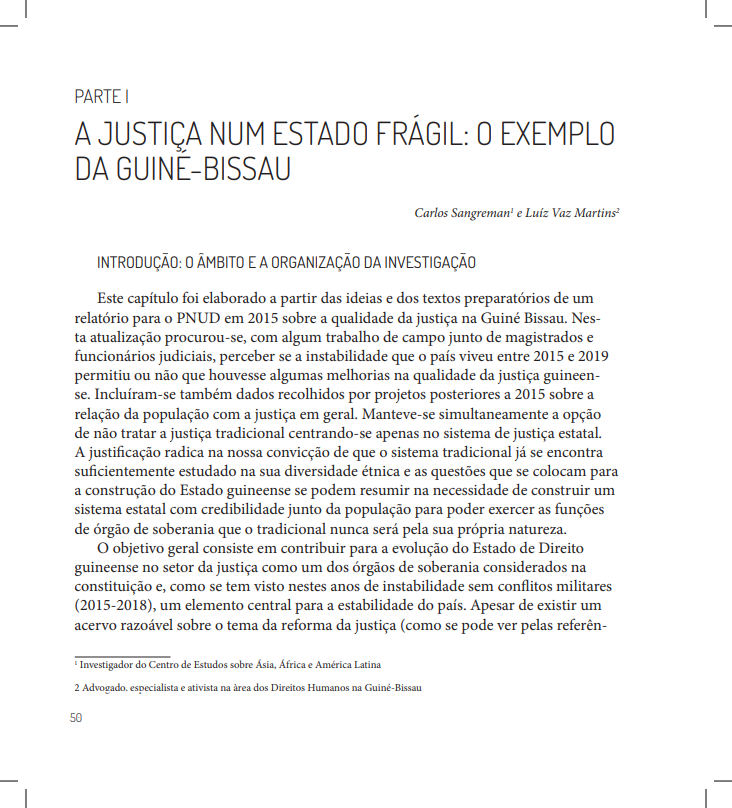
Qualidade da Justiça na Guiné-Bissau. Avaliação e recomendações.
Abstract:
The debate on justice is fundamental to understanding the conditions for the realisation of fundamental rights. The reflection on justice and human rights in Guinea-Bissau, which permeates the project “Cooperation in the Promotion of Human Rights: the case of Justice in Guinea-Bissau in the Rights Observatory”, promoted by ACEP and CEsA and funded by Camões-ICL, is part of the work of both organisations with the Guinean League of Human Rights in the Rights Observatory. Since 2015, this Observatory has been collecting and analysing data, throughout the territory of Guinea-Bissau, on the realisation of social and economic rights, and the reflection on justice represents a contribution to stimulating debate and knowledge on one of the most important monitoring areas for the country’s development. Furthermore, ACEP participated, as an associated organisation, in a project of the Guinean Human Rights League on impunity in Guinea-Bissau, and researchers from CEsA have carried out research and published articles on justice, the State and international cooperation in this country. Qualidade da Justiça na Guiné-Bissau. Avaliação e recomendações was prepared based on the ideas and preparatory texts of a report for UNDP in 2015 on the quality of justice in Guinea-Bissau. This update sought, through some fieldwork with magistrates and judicial officials, to understand whether or not the instability that the country experienced between 2015 and 2019 allowed for some improvements in the quality of justice in Guinea-Bissau. It also included data collected by projects after 2015 on the population’s relationship with justice in general. At the same time, the option of not dealing with traditional justice was maintained, focusing only on the state justice system.
Quotation:
Sangreman, Carlos e Luis Vaz Martins (2019). “Qualidade da Justiça na Guiné-Bissau. Avaliação e recomendações”.In Justiça e direitos humanos na Guiné-Bissau, Debates e Perspetivas. ISBN 978-989-8625-18-2, 2019, ACEP e CESA, Lisboa.
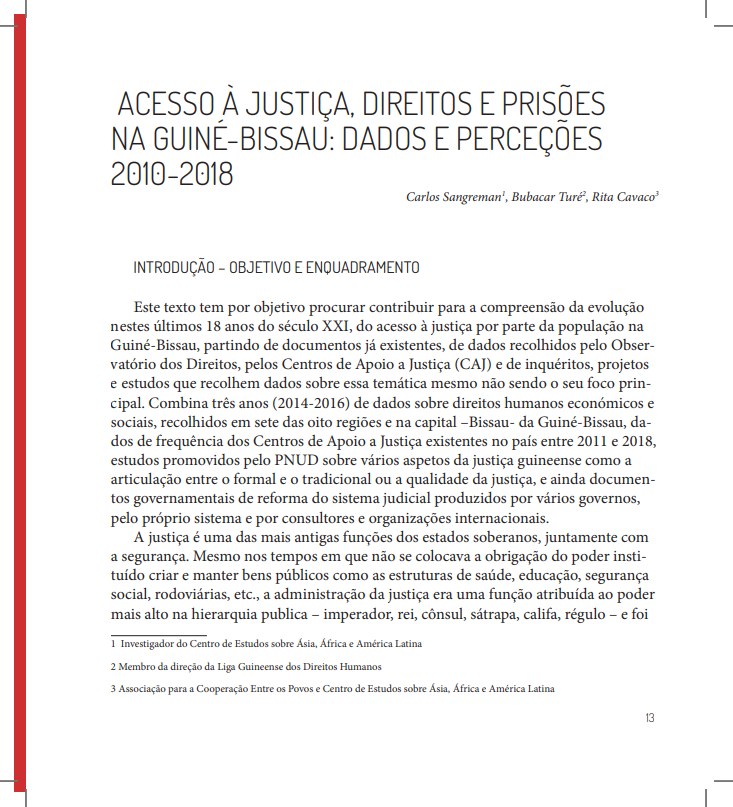
Acesso a Justiça, Direitos e Prisões na Guiné – Bissau. Dados e Perceções 2010-2018
Abstract:
The debate on justice is fundamental to understanding the conditions for the realisation of fundamental rights. The reflection on justice and human rights in Guinea-Bissau, which permeates the project “Cooperation in the Promotion of Human Rights: the case of Justice in Guinea-Bissau in the Rights Observatory”, promoted by ACEP and CEsA and funded by Camões-ICL, is part of the work of both organisations with the Guinean League of Human Rights in the Rights Observatory. Since 2015, this Observatory has been collecting and analysing data, throughout the territory of Guinea-Bissau, on the realisation of social and economic rights, and the reflection on justice represents a contribution to stimulating debate and knowledge on one of the most important monitoring areas for the country’s development. Furthermore, ACEP participated, as an associated organisation, in a project of the Guinean Human Rights League on impunity in Guinea-Bissau, and researchers from CEsA have carried out research and published articles on justice, the state and international cooperation in this country. Acesso a Justiça, Direitos e Prisões na Guiné – Bissau. Dados e Perceções 2010-2018 aims to contribute to the understanding of the evolution of access to justice by the population in Guinea-Bissau over the last 18 years of the 21st century, based on existing documents, data collected by the Observatory of Rights, the Justice Support Centres (CAJ) and surveys, projects and studies that collect data on this theme even though it is not their main focus.
Quotation:
Sangreman, Carlos, Bubacar Turé e Rita Cavaco (2019). “Acesso a Justiça, Direitos e Prisões na Guiné – Bissau. Dados e Perceções 2010-2018”.in Justiça e direitos humanos na Guiné-Bissau, Debates e Perspetivas. ISBN 978-989-8625-18-2, 2019, ACEP e CESA, Lisboa.
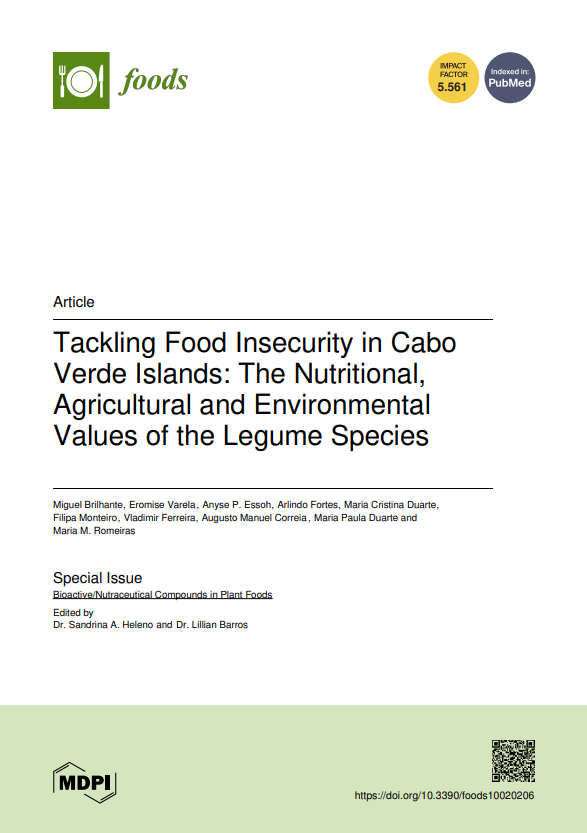
Tackling Food Insecurity in Cabo Verde Islands: The Nutritional, Agricultural and Environmental Values of the Legume Species
Abstract:
Legume species are important food sources to reduce hunger and deal with malnutrition; they also play a crucial role in sustainable agriculture in the tropical dry islands of Cabo Verde. To improve the knowledge of the heritage of plant genetic resources in this Middle Income Country, Tackling food insecurity in Cabo Verde Islands: the nutritional, agricultural and environmental values of the legume species had three main goals: (i) to provide a checklist of food legumes; (ii) to investigate which species are traded in local markets and, based on field surveys, to compare species for their chemical, phenolic, antioxidant, and nutritional composition; and (iii) to discuss the agronomic value and contribution to food security in this archipelago. Our results revealed that 15 species are used as food and 5 of them are locally traded (Cajanus cajan, Lablab purpureus, Phaseolus lunatus, Phaseolus vulgaris, and Vigna unguiculata). The role of these species as sources of important minerals, antioxidants, and nutritional components for food security is highlighted, and the native ones (Lablab purpureus and Vigna unguiculata) stand-out as particularly well-adapted to the climate of these islands, which are already experiencing the adverse effects of climate change. We conclude that the sustainable use of these genetic resources can contribute to the reduction of hunger and poverty, thus meeting some challenges of the Sustainable Development Goals.
Quotation:
Brilhante, M., Varela, E., Essoh, A.P, Fortes, A., Maria Cristina Duarte, M.C., Monteiro, F., Ferreira, V., Correia, A. M., Duarte, M.P; Romeiras, M. M (2021). Tackling food insecurity in Cabo Verde Islands: the nutritional, agricultural and environmental values of the legume species. Nutrients, 13. MDPI. Pag. 17. https://www.mdpi.com/2304-8158/10/2/206
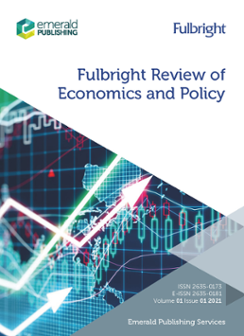
Common causes in grassroot development: a case for community-based and community-driven response in the postpandemic era
Abstract:
The purpose of Common causes in grassroot development: a case for community-based and community-driven response in the postpandemic era is to determine the impact of community-based and driven approaches during the lockdowns and early periods of the pandemic. The study examines the impact and perceptions of the state-led intervention. This would help to discover a better approach for postpandemic interventions and policy responses. This article used the inductive method and gathered its data from surveys. In search of global opinions on COVID-19 responses received in communities, two countries in each continent with high COVID-19 infection per 100,000 during the peak period were chosen for study. In total, 13 community workers, leaders and members per continent were sampled. The simple percentile method was chosen for analysis. The simple interpretation was used to discuss the results. The study showed that poor publicity of community-based interventions affected awareness and fame as most were mistaken for government interventions. The study found that most respondents preferred state interventions but preferred many communities or local assessments of projects and interventions while the projects were ongoing to adjust the project and intervention as they progressed. However, many preferred community-based and driven interventions.
Quotation:
Patrick-Agulonye, U.V. (2021). “Common causes in grassroot development: a case for community-based and community-driven response in the postpandemic era” Fulbright Review of Economics and Policy, Vol. 1 No. 2, pp. 186-204. https://doi.org/10.1108/FREP-09-2021-0056

State of the Art About COVID-19’s Impact on Santiago University, Cape Verde
Abstract:
The COVID-19 pandemic has become a critical challenge for the higher education sector worldwide. Under such a circumstance, the exploration of the capacity of this sector to adapt to such a state of uncertainty has become of huge importance. In this chapter, State of the art about COVID-19 impact in Santiago University – Cape Verde, the authors critically reflect on the Cape Verdean teaching experience during the early COVID-19 lockdown. This is an exploratory case study based on a qualitative approach with an aim to reflect on new practices of teaching under a pandemic emergency. Based on the teaching experience of teaching in Santiago University, they explain how this university has changed from a face-to-face to an online teaching system and stress the challenges and opportunities that appear from this transition process. This chapter concludes that this strategy has become an opportunity to the university since it consistently raised the number of international students cooperating with them and also that the more adaptive and resilient approaches to online teaching were also a success.
Quotation:
Sarmento, E., Monteiro, J. (2021). Capítulo 16: State of the art about COVID-19 impact in Santiago University – Cape Verde. In Loureiro, Sandra & Guerreiro, João (eds.) Handbook of Research on Developing a Post-Pandemic Paradigm for Virtual Technologies in Higher Education. ISBN13: 9781799869634; ISBN10: 1799869636. IGI Global (Q2, SJR:0,338)
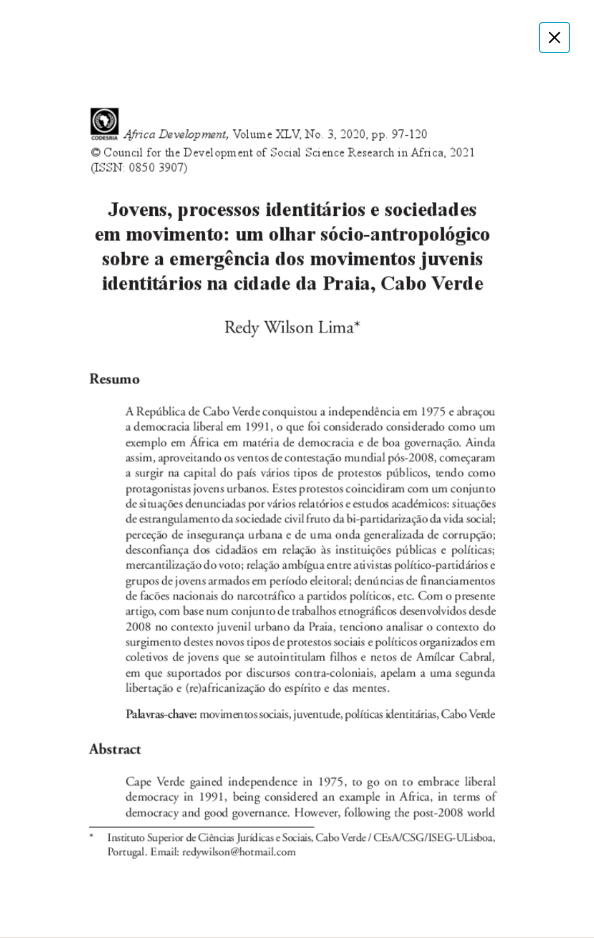
Jovens, processos identitários e sociedades em movimento
Abstract:
The Republic of Cape Verde gained independence in 1975 and embraced liberal democracy in 1991, which was regarded as an example in Africa of democracy and good governance. Still, taking advantage of the post-2008 global winds of protest, various types of public protests began to emerge in the country’s capital, with urban youth as the main protagonists. These protests coincided with a set of situations denounced by various reports and academic studies: situations of strangulation of civil society resulting from the bi-partisanship of social life; perception of urban insecurity and a generalized wave of corruption; citizens’ distrust of public and political institutions; commercialization of the vote; ambiguous relationship between political party activists and armed youth groups during elections; accusations of funding of political parties by national drug trafficking factions, etc. Jovens, processos identitários e sociedades em movimento: um olhar alternativo sobre os movimentos sociais urbanos emergentes na cidade da Praia – Cabo Verde, based on a set of ethnographic works developed since 2008 in the urban youth context of Praia, intends to analyse the context of the emergence of these new types of social and political protests organized in youth groups who call themselves sons and grandsons of Amílcar Cabral, supported by counter-colonial discourses, calling for a second liberation and (re)Africanization of the spirit and minds.
Quotation:
Lima, R.W. (2020). “Jovens, processos identitários e sociedades em movimento: um olhar alternativo sobre os movimentos sociais urbanos emergentes na cidade da Praia – Cabo Verde”. In: Jesus, L.S.B.; Barros, M.; Filice, R.C.G. (Orgs.), Tecendo redes antirracistas II: contracolonização e soberania intelectual. Fortaleza: Imprensa Universitária, p. 116-136.





